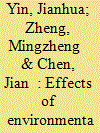|
|
|
Sort Order |
|
|
|
Items / Page
|
|
|
|
|
|
|
| Srl | Item |
| 1 |
ID:
105773


|
|
|
|
|
| Publication |
2011.
|
| Summary/Abstract |
This research sets out to explore the possibilities for further saving in household electricity consumption through a study of the residents' willingness and behavioural characteristics in electricity saving, as applied within a Chinese context. Based on an extensive literature review, the authors argue that economic benefits, policy and social norms, and past experience may have a positive correlation with household electricity-saving behaviour, while the discomfort caused by electricity-saving activities, may exert a negative effect on it. Through a sample of 816 randomly selected residents in Beijing, the propositions are examined using logit regression analysis. The conclusions support the ideas, concerning both the positive influence of economic benefits, policy and social norms, and past experience as they affect broader electricity-saving behaviour, and the negative influence of the discomfort caused by electricity-saving activities. Finally, some inferences are drawn, and suggestions are offered for policy makers and further studies.
|
|
|
|
|
|
|
|
|
|
|
|
|
|
|
|
| 2 |
ID:
137694


|
|
|
|
|
| Summary/Abstract |
Based on environmental Kuznets curve theory, a panel data model which takes environmental regulation and technical progress as its moderating factors was developed to analyse the institutional and technical factors that affect the path of low-carbon economic development. The results indicated that there was a CO2 emission Kuznets curve seen in China. Environmental regulation had a significant moderating effect on the curve, and the inflection of CO2 emissions could come substantially earlier under stricter environmental regulation. Meanwhile, the impact of technical progress on the low-carbon economic development path had a longer hysteresis effect but restrained CO2 emission during its increasing stage and accelerated its downward trend during the decreasing stage which was conducive to emission reduction. Strict environmental regulation could force the high-carbon emitting industries to transfer from the eastern regions to the central or the western regions of China, which would make the CO2 Kuznets curve higher in its increasing stage and lower in its decreasing stage than that under looser regulation. Furthermore, energy efficiency, energy structure, and industrial structure exerted a significant direct impact on CO2 emissions; we should consider the above factors as essential in the quest for low-carbon economic development.
|
|
|
|
|
|
|
|
|
|
|
|
|
|
|
|
| 3 |
ID:
111420


|
|
|
|
|
| Publication |
2012.
|
| Summary/Abstract |
Energy technology innovation plays a crucial role in reducing carbon emissions. This paper investigates whether there is relationship between energy technology patents and CO2 emissions of 30 provinces in mainland China during 1997-2008. Gross domestic product (GDP) is included in the study due to its impact on CO2 emissions and energy technology innovation, thus avoiding the problem of omitted variable bias. Furthermore, we investigate three cross-regional groups, namely eastern, central and western China. The results show that domestic patents for fossil-fueled technologies have no significant effect on CO2 emissions reduction; however, domestic patents for carbon-free energy technologies appear to play an important role in reducing CO2 emissions, which is significant in eastern China, but is not significant in central, western and national level of China. The results of this study enrich energy technology innovation theories and provide some implications for energy technology policy making.
|
|
|
|
|
|
|
|
|
|
|
|
|
|
|
|
|
|
|
|
|